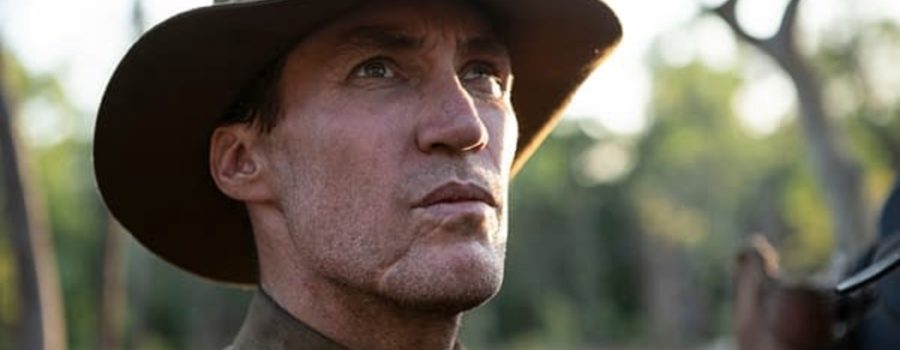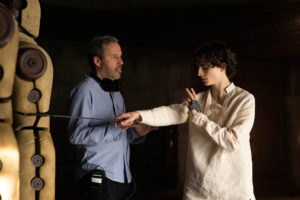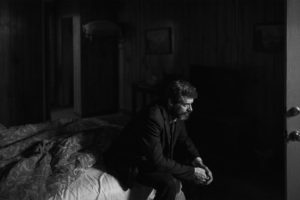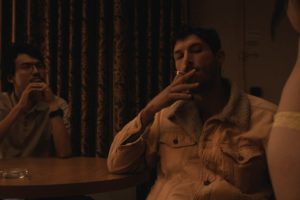[Published at Film Inquiry] The first person to star in both the MCU and DCEU as Jack Rollins (Captain America: Civil War, Avengers: Endgame) and KGBeast (Batman v Superman: Dawn of Justice), respectively, Callan Mulvey has experienced immense success in action films. However, with roles in films and television series such as 2014’s Miss Meadows, 2016’s Power, and 2020’s The F**k-It List, Mulvey proves his range beyond the action genre. His new film, High Ground, is a continuation of the Australian native’s rising star as well as a testament to his talent.
High Ground tells the story of an ex-soldier (Simon Baker) who enlists the help of an Indigenous Australian to track down the latter’s uncle, a feared warrior throughout the Territory. Meanwhile, his former fellow soldier, Eddy Ambrose (Mulvey), and their commanding officer track the uncle in an attempt to cover up a heinous crime against humanity 12 years prior.
On the cusp of High Ground‘s release, I had a chance to speak with Mulvey about the making of the film, the shameful history of Western colonization of Indigenous Peoples, juggling roles in the MCU and DCEU, Megan Fox‘s Till Death, the Russo Brothers‘ The Gray Man, and more.
Alex Arabian for Film Inquiry: What intrigued you about High Ground before saying “yes” to it?
Callan Mulvey: It was a unique perspective. More often than not, historical films portray our indigenous culture as victims, and I just responded to the story. It was unique, something that I was completely ignorant of. I didn’t know that it happened. Whilst I know it’s a pretty heinous past with colonization, I wasn’t very educated about it all. And then, of course, getting Simon Baker and Jack Thompson involved was the icing on the cake. Initially, I got sent the project to read for interest, to see if I wanted to do it. And I read it and pretty much immediately accepted.
Like you said, it doesn’t sugarcoat the brutality of colonialism. Is that something the director specifically wanted to capture with this film?

Callan Mulvey: Very much so. Firstly, the film couldn’t have been made at all without the traditional owners’ consent, assistance, and trust in us telling the story. And it was a story that this is something that happened. Aboriginal culture being an oral tradition in terms of passing down the knowledge, these stories are around and known even many, many years later. And that problem still exists. And because of the traditional owners, we were allowed into areas where Caucasians have never set foot. And it was a great honor to go in there. You cannot really attempt to tell this story without depicting the degree of brutality and violence that did occur and has occurred throughout the history of Australia.
What is your character, Eddy Ambrose, motivated by over the course of the 12 years in the film?
Callan Mulvey: He just can’t deal with his shame and his guilt, and initially the horrors of the war. I was informed also by knowledge of that time period and how fathers and men are and were, generally, and also in terms of a father-son relationship. So they weren’t able to communicate or speak about their feelings, or even demonstrate them outside of what was considered masculine and manly, so to speak. So he was rather inept at expressing himself, and probably there was not much of emotional intelligence. And then going off to war as a young man and the horrors that everybody involved in any war views, sees, and is subjected to, has a deep and damaging effect. And it did so with Ambrose.
But their saving grace was having Travis there, who he reveres in place of a father figure. So to then come back and he has a very deep bond with Travis and, at end of the day, he knows that he made a grave mistake and that he was responsible for a horrific and devastating and absolutely unnecessary event – and that he knows that he carries a deep shame and guilt about that, that he maybe doesn’t want to face or can’t face. – to have the person he reveres and trusts most reject him, confirms and shines a light on the guilt and shame he was already carrying. And for it to come from somebody so special to him, and for that person then to reject him, is devastating, and something that he is unable to reconcile with.
He can’t even reconcile with his own feelings of guilt and shame, let alone with being called out about it and the responsibility that he needs to take. He then projects and attaches his guilt and shame and anger and hatred to the indigenous population as a way to not face the music. And that’s the only way he knows to channel his rage and his anger and his pain, essentially, at the foundation of it all, which is why he is so horrific and awful towards the indigenous population at large.
It seems like he wants to reconcile his guilty conscience by killing the past, versus confronting what really happened like Simon Baker’s character does.
Callan Mulvey: Yeah. It’s primarily a very large indigenous population up that way, particularly at that time. And you’re having constant interactions with the indigenous population. So almost every Aboriginal that he came across is a reminder of his mistakes and his guilt and shame. It’s constantly triggering, and it’s something he can’t escape from.
It almost feels like an allegory for the history of the region and Western expansion, in general. Were you taught some of this history growing up in school in Australia?
Callan Mulvey: A little bit, but it’s the colonial version. When I was at school, if there was anything, it was the “civilizing of the savages,” and it’s certainly an uncomfortable past for many people. It’s something that you don’t necessarily know about, and it’s a Pandora’s box of issues. But, personally, I was largely unaware of what has happened. I just bought Robert Hughes’s “The Fatal Shore,” which I’m just about to read and get hold of a more accurate description of what has happened, largely, in terms of colonization here. We often get the watered-down version or not really the whole truth. I would like to know as much about what has happened in the past that was the truth and not the filtered version or the watered-down version.

I feel the same way with Native Americans. Learning the watered-down version in school versus learning the whole truth as I got older.
Callan Mulvey: Yeah. Unfortunately, colonialism has always been motivated by money, and it’s quite shocking to see the brutality of what humans are capable of doing to each other. And particularly with indigenous populations the world over, throughout history.
Great point. Some of your most successful films are action films. Do you have a specific genre preference to act in?
Callan Mulvey: No. Sometimes, it’s just whatever work you can get. And other times, you have a little bit more choice. And it has also evolved over time throughout my working life. Now, it comes down to the script, the director, and the character. Sometimes, you love something so much that you would pay to do it. Or where you have to do it. You have to play this role and you’ll do anything to do that because it inspires you and it’s a story you want to be a part of to tell. And conversely, I’m playing characters in situations that Cal would never go anywhere near. So when you’re running down a hallway with an M16 and 16 burly stuntmen behind you, it’s pretty hard for that little boy who loves to swing swords and play cops and robbers and stuff not to come out somewhat.
You’re the first actor to appear in both the MCU and the DCEU, which is quite a feat.
Callan Mulvey: Yeah. Somebody else has joined the fray now. But yeah, I’m not sure how that happened. I think it was either one side didn’t know that I had been working with the other side, and that’s how it came about.
Is Jack Rollins coming back to the MCU?
Callan Mulvey: No idea. He could, potentially. That ship came down on the complex, so he could have made it out. But I’ll have to wait and see.
On the other side, it seems like KGBeast’s fate in the DCEU is way more solidified.
Callan Mulvey: Yeah. But there’s regenerative technology in there.
Right. And with the multiverses going on, you never know.
Yeah, exactly. Who knows, mate? Maybe I bag a trilogy and then some way they find a way to regenerate me.
Callan Mulvey: I like that idea. So one of your upcoming films, Till Death, is a highly anticipated film co-starring Megan Fox. Are you able to talk about your role as Bobby in that film?
Yeah. Scott Dale who’s brilliant and who I love, he’s our director, an Aussie. And I had such a great experience working with him. He is definitely someone to watch. He just sent me a clip of Megan going on to The Kelly Clarkson Show. There was a little bit of footage, and it looks great. He was a fun character to play because, often, I’m playing characters who are pretty much awful people who do awful things, and the challenge is to find a way to make sense of how they got there. What trauma did they experience? Or pain? What made them that way? And if I can find that – and I certainly don’t accept or absolve them of their responsibilities for their actions – but if I can understand how they got there and what makes them tick…that was fun to do with that character, with Bobby and with that great cast. And Scott is just such a wonderful human and a talented director that it was a great project to be involved in and I’m very excited to see. And seeing that little clip of that interview confirmed that it looks as great as I hoped it would be.
How was it reuniting with the Russo Brothers outside of the MCU in The Gray Man?
Callan Mulvey: It’s great. Obviously, they’re ridiculously successful and talented. But there’s no ego with those guys. They’re so collaborative, and it’s really the best idea wins, doesn’t matter who it comes from. And they’re an absolute pleasure to work for. They’re open to input. And they treat everyone the same. There’s no hierarchy with those guys. It’s great fun to work with them.
Film Inquiry would like to thank Callan Mulvey for taking the time to speak with us!
High Ground hits On Demand and Digital on May 14, 2021.








Leave a Reply
Your email is safe with us.